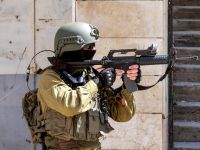U.S. Secretary of State Colin Powell was due to leave the Middle East on Wednesday, despite so far failing to broker a deal on a cease-fire or an Israeli pullout from Palestinian cities.
Powell said Tuesday that negotiations with Israelis and Palestinians were making progress, but hinted that the outcome could be something less than a mutually proclaimed cease-fire. Palestinian officials have told Powell no cease-fire can hold while Israeli troops remain in West Bank cities.
He was scheduled to hold a news conference at 13:30 p.m. (10:30 a.m. GMT) at his Jerusalem hotel before departing.
Meanwhile in Washington, President Bush signed a routine document Tuesday that gave Yasser Arafat's Palestine Liberation Organization permission to have an official presence in the capital.
According to AP, this time, however, permission was tied to conditions including a cease-fire in the Middle East, resumption of security cooperation with Israel against “terror” and an immediate order to crack down on “terrorist” networks. These conditions were to be met immediately.
The Bush administration also said it would tie future aid to the Palestinians to their success in “fighting terror.” "We will be watching Palestinian compliance very closely," an official said.
For his part, Arafat, talking to Tunisian television from his office, expressed frustration at U.S. progress so far.
"Powell had spent more than one week in the region, a week and a half in the region, but nothing has happened," he said. He urged swift action to force Israel to withdraw.
"International and Arab action is needed as quickly as possible because the situation is highly dangerous," he said. Arafat also termed Israel’s Prime Minister Ariel Sharon "bloodthirsty."
In Bethlehem, Palestinian fighters holed up in the Church of the Nativity exchanged fire with Israeli soldiers who have besieged the church for two weeks since invading this city.
"The exchange of fire lasted for about an hour...It is hard for us to determine who started the shooting," Father Seweryn Lubecki told Reuters by telephone from the church. "It seems that the basilica was not damaged. The Israeli soldiers are very careful not to damage it."
Sharon told Israeli television that officials of the U.S. Central Intelligence Agency were mediating a deal whereby the Palestinians in the church wanted by Israel for "terror activities" would surrender and either face trial in Israel or be expelled. Palestinian officials in the city have so far rejected the deal.
The Israeli army imposed a curfew on Abu Dis and Eizariyah, two suburbs of Arab east Jerusalem which are under Israeli security control, according to interim peace deals, in what officials said was a search for "armed terrorists" hiding in the area.
In the northern West Bank, aid agencies urged Israel to allow fuller access to Jenin refugee camp, the site of fierce fighting and heavy casualties. Palestinian officials called for an inquiry into allegations that Israeli troops massacred people in the camp, a claim Israel has dismissed as propaganda.
Medical workers said 15 bodies collected from the refugee camp, scene of the fiercest fighting in Israel's offensive, had been buried temporarily in the hospital courtyard. Two more were buried in the gardens of their homes.
Palestinian cabinet minister Nabil Shaath called for an inquiry into allegations Israeli troops massacred Palestinians in the the camp. There has been no firm casualty count from the Jenin refugee camp. Israel says around 70 Palestinians, most of them gunmen were killed. The Palestinians say the number is much higher.
In Gaza, a Hamas member was killed by Israeli tank and gunfire and two others wounded after they fired rockets at Jewish settlements in northern Gaza late on Tuesday. (Albawaba.com)
© 2002 Al Bawaba (www.albawaba.com)









